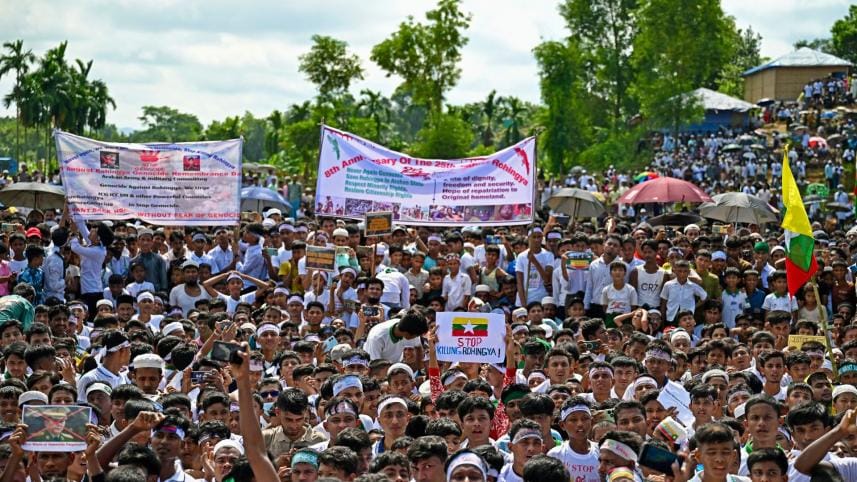Dialogue on Rohingya crisis ends with calls for continuous global funding

A three-day stakeholders' dialogue on the Rohingya crisis ended in Cox's Bazar yesterday with participants urging uninterrupted international funding to avert a deeper humanitarian disaster until the Rohingyas can return to Myanmar in a voluntary, safe, dignified, and sustainable manner.
Diplomats stationed in Dhaka, representatives of international organisations, political leaders and experts visited the WFP's food distribution outlets and witnessed the activities of the UN Refugee Agency UNHCR and Friendship Hospital at three different locations of the Rohingya camps.
"The Rohingya population is gradually growing while the funding is declining," Chief Adviser's Deputy Press Secretary Abul Kalam Azad Majumder told reporters at the Rohingya camps.
He highlighted the importance of uninterrupted flow of funding for the Rohingyas to avoid any further humanitarian crisis.
Not just for the Rohingyas, Azad said, it will be very difficult for everyone working at the camps if the funding issues are not addressed.
As of today, the funding of the Joint Response Plan stands at approximately 60%.
Eight long years have passed since about 750,000 Rohingyas were compelled to flee Myanmar to Bangladesh, pushed by unspeakable violence and human rights violations in Myanmar's Rakhine state. There are presently over 1.3 million Rohingyas in Bangladesh.
United Nations Assistant Secretary-General and UNHCR Assistant High Commissioner for Operations Raouf Mazou said Bangladesh's response has been remarkable, with local populations welcoming those in desperate need despite the difficult circumstances in which they sometimes find themselves.
The international community has played its role, providing hundreds of millions of dollars to respond to the humanitarian needs of refugees in Cox's Bazar and in Bhasan Char.
"However, as the situation has prolonged, and the number of forcibly displaced has continued to increase around the world, reaching 120 million by the end of 2024, it has become increasingly difficult to mobilise the resources required," said Mazou.
"While the continued provision of food assistance could be secured until December the availability of LPG beyond September is uncertain. Services such as education and health have already been reduced," he said.
There are an estimated 3.5 million internally displaced persons in Myanmar, and in the past 18 months alone, 150,000 more Rohingya have fled targeted violence to Bangladesh.
"We need more innovative approaches that accommodate the need for refugees to retain their ability to play an active role in the reconstruction of their country while not creating conditions that would make the eventual return elusive," he said.



 For all latest news, follow The Daily Star's Google News channel.
For all latest news, follow The Daily Star's Google News channel.
Comments